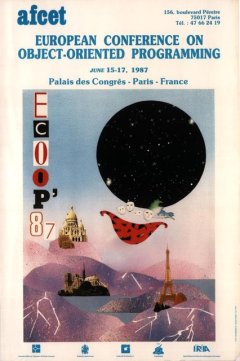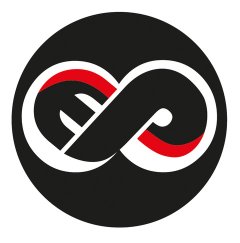Latest News
- Tue 28 Jun 2022 by Christoph Matthies
Recording of Dan Ingalls' ECOOP'22 Keynote Available
A recording of Dan Ingalls’ AITO Dahl-Nygaard Senior Prize Keynote is now available on YouTube
- Sat 18 Jun 2022 by Christoph Matthies
Upcoming VCOOP Meetings in June!
The next VCOOP meetings will take place on June 23rd & 30th, and 7th July! Find the full program for these days here
Virtual ECOOP (VCOOP'22)
Due to travel restrictions and the unforeseeable future ECOOP’22 will offer the possibility to present accepted publications in a virtual setting. See more details here.
It is possible to publish papers at ECOOP’22 without being present physically in Berlin
A new ECOOP for these brave new times
Started in 1987, ECOOP is Europe’s oldest programming conference. That summer, at the Palais des Congres in Paris, the conference aimed to promote an up-and-coming new software paradigm, object-oriented programming.
In the following years, what was at first a heretical attempt to redefine how we approach programming gradually took over the software world and, over time, ECOOP slowly broadened in scope to accept a larger variety of papers. To the point that, in 2021, only three out of the twenty-five papers presented in Aarhus directly addressed that paradigm.
It is time to recognize that fact.

Changes for ECOOP'22

For ECOOP’s 35th anniversary changes are in the air. The conference is rebranding with a new logo to mark its proud embrace of the entire landscape of programming technologies. More profoundly, the reviewing and publishing model of the conference are being reshaped.
-
Broader Scope. ECOOP welcomes contributions in all aspect of practice and theory of programming languages, systems and environments, ranging the whole spectrum from novel ideas to evaluation of existing solutions. Authors can pick one of four broad categories: research papers, reproduction studies, experience papers, and brave new ideas or pearls. Negative results and short papers are welcome.
-
Continuous Submissions. ECOOP is moving towards frequent submission deadlines. As a first step, in 2022, ECOOP will have two rounds of submissions, one in December and the second in March. Each round is double-blind and delivers its results within two months.
-
Collaborative Reviewing. ECOOP encourages constructive reviewing where papers that are not accepted outright are given clear and actionable suggestions for improvements so that they can be resubmitted in subsequent rounds. Thus following the reviewing model of many journals but with timely reviews. Unlike conference reviewing, the same reviewers will remain attached to a submission throughout the process even if it takes multiple rounds.
-
Frictionless Submission. ECOOP enforces neither strict page limits nor strict formatting requirements for submitted papers. Instead, we encourage authors to write what the clearest possible submission while keeping in mind that reviewers can only spend the same finite amount of time on each paper.
-
Artifacts Now. Artifacts supporting the scientific claims of papers can now submitted together with their paper and thus all authors will benefit from the feedback of the artifact evaluation committee.
-
Open Access. ECOOP remains committed to open access, all papers appearing the proceedings of the conference, all talks, and all artifacts will be archived and made available free of charge and without author processing fees.
-
Journal First. ECOOP papers can be submitted to special issues of three journals, TOPLAS, Science of Computer Programming and the Journal of Object Technology. The requirements of these journals apply for submissions. For SCP and JOT, the ECOOP program committee will act as reviewers with the same deadline. TOPLAS follow its own process. JOT is open access.
-
Journal After. Selected papers will be invited to publish extended versions in special issues of our associated journals. An extended abstract of the paper will appear in the ECOOP proceedings. Journal after submission at SCP and JOT are reviewed by the ECOOP PC, while TOPLAS uses its own process.
-
Hubs and Spokes. Travel is a privilege and an environmental burden, ECOOP commits to make remote participation possible for any author or attendees by creating two events. The virtual event will be organized to allow for attendance across the globe. The physical event will be regional hub for community building. Authors of papers published at earlier SIGPLAN conference and APLAS will be invited to present in person if they so choose.



